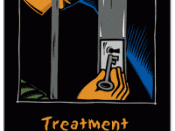Any close examination of the "war on drugs" metaphor leads inescapably to the conclusion that one weapon could bring us to the brink of victory--legalization. But most who discuss this option consider it surrender.
How have we confused surrender with victory? Let's start by looking at the "war on drugs" metaphor closely, and define some "war" terms. First, who or what is the "enemy?" Second, what defines "victory" in this "war?"
Is the "enemy" in this "war" the drug addict? No reasonable person believes that. Addicts are in many ways the victims of a "war" policy that drives up the price of their craved substances to the point where criminal activity is their only alternative to cold turkey. Alcoholism is often described as a sickness. Drug addicts merit the same consideration alcohol addicts receive.
Is the "enemy" in this "war" the drug dealers and cartels? If we accept this premise, the argument becomes too easy! If they are the only enemy, then legalization wipes them out with one blow! The huge profits from the inflated black market prices would be gone.
That money is their only source of power. Without the vast wealth accumulated from the black market, their now-powerful organizations would crumble, degenerating into the common thugs they really are. But the drug dealer is not the real "enemy;" that would be too simple.
When President Nixon originally initiated the "war on drugs" rhetoric, he referred to "drug abuse" as the problem. So the most effective way to analyze this metaphor is to identify "drug abuse" as the "enemy" we are fighting.
Now that we have identified the "enemy," what would constitute "victory" over that enemy? Would victory be the total eradication of drugs from our society? If "drugs" and not "drug abuse"...



Good essay but,
The answer to the drug problem is a simple one to a logical mind. MONARCHY, why Monarchy you ask? Its rather simple actually, any amount of any drug equals a swift and violent execution. This is what the king of Malaysia guarenteed anyone caught with illegal narcotics. Hence, now the drug problem in Malaysia is almost "non-existant." Could a "Federal Republic" like the government of the United States impliment such a law? Not in this century, too many people would cry, "Unconstitutional," or "Too Severe a punishment." Legalization is not the key to the problem. You think its bad now imagine millions of people running around stoned all the time, yeah what a soceity that would be.
3 out of 3 people found this comment useful.